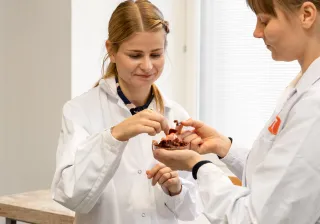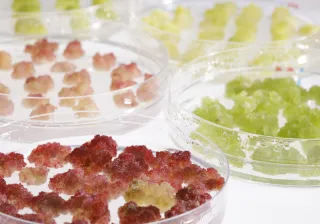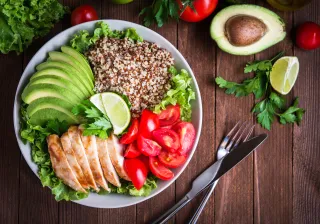Unsustainable cultivation methods, health issues and the scarcity of natural resources are all hindering the current use of vegetable, palm and coconut oils in food products. A pioneering, sustainable solution is utilising microbial lipids as new fat and oil substitutes. Partnering with VTT enables food companies to accelerate the journey of microbial lipids from lab to market.
The future of the food industry is driven by increasing consumer demand for ethical, eco-friendly, and healthy alternatives. While much attention has focused on plant-based proteins, lipids – the fats and oils essential for flavour and texture – are equally critical in creating alternatives to animal-based products that fulfil consumer requirements. VTT, a leader in cellular agriculture and industrial biotechnology, is pioneering the development of microbial lipids to address this need.
Traditional lipid sources, such as palm and coconut oils, present significant sustainability and health challenges. Unsustainable farming practices associated with these oils have led to deforestation and biodiversity loss. Additionally, their high levels of saturated fats raise health concerns, contributing to cardiovascular risks.
Economically, palm and coconut oils are subject to volatility due to dependency on crop yields and fluctuating market conditions, making them an unreliable resource for the food industry. The combination of these factors drives the need for alternative lipid sources that are both sustainable and healthy.
Economic advantage by customising lipid profiles
Microbial lipids, produced by yeasts, fungi, and algae, offer a game-changing solution to these challenges. Besides reducing environmental impacts, their controlled production processes offer economic benefits by enabling predictable and stable costs. One of the most significant advantages of microbial lipids is their customisability. Their fat profiles can be tailored to mimic animal fats, providing the flavour and texture consumers expect from meat and dairy substitutes.
“Based on our decades of experience in both food research and biotechnology, VTT is well equipped to produce sustainable food lipids efficiently in bioreactors. We have an extensive culture collection of thousands of strains as source for the microbial hosts and can achieve the desired lipid profiles by optimising the growth conditions of microbes,” says Principal Scientist Kari Koivuranta at VTT.
An example of VTT’s innovation is its work in replacing cocoa butter with microbial lipids. By cultivating specific yeast strains and using industrial side streams as carbon sources, VTT was able to achieve lipid profiles that closely resemble cocoa butter.
From laboratory to industrial scale
The scalability to cost-effective and large-scale bioprocesses is one of the main hurdles for the commercialisation of microbial lipid production. VTT’s state-of-the-art piloting facilities, equipped with various bioreactors and downstream processing tools, enable efficient lipid production at scale.
When conducting research, VTT considers it crucial to understand the customer’s entire industrial process and specific needs – for example in developing drop-in solutions that can be easily integrated with existing equipment. VTT also offers valuable support in navigating regulatory challenges, a crucial aspect of bringing new food products to market.
“Our multidisciplinary expertise makes VTT a strategic partner for companies seeking to harness the potential of microbial lipids. We excel in advanced strain development, employing both classical mutagenesis and targeted genetic modifications to create high-yield strains with specific lipid profiles. Additionally, our sensory and analytical testing capabilities ensure that final products meet consumer expectations for taste and texture, a critical factor in market success,” says Business Development Manager Mirva Lampinen from VTT.

The future of food production
Partnering with VTT allows companies to fast-track their innovation journey, benefiting from reduced R&D costs and access to cutting-edge technology. VTT is an experienced partner for food ingredients producers, food additives and meat alternatives, as well as for bioreactor cultivation and biotechnology companies. With its extensive expertise in microbial lipid production, VTT can help companies revolutionise the food industry.
“We provide expertise, experience, and solutions for producing and tweaking the desired food lipids in a sustainable and scalable way. Together, we can create food products that are not only better for the planet but also meet the expectations of today’s consumers,” Lampinen concludes.








